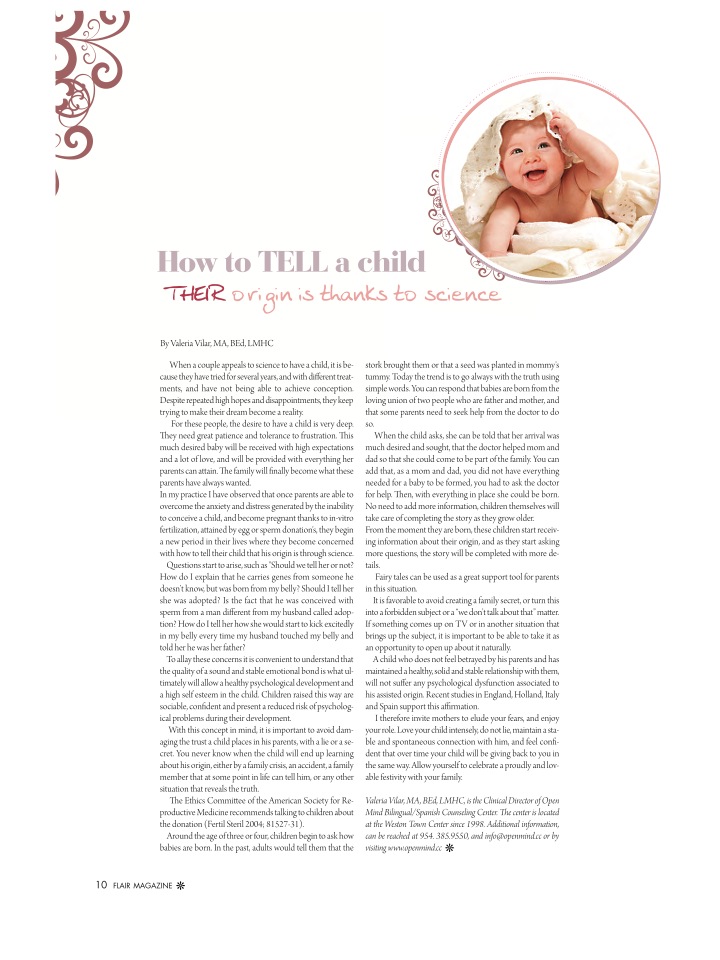How to tell a child that their origin is thanks to science


How to tell a child that their origin is thanks to science

By Valeria Vilar, MA, BEd, LMHC
When a couple appeals to science to have a child, it is because they have tried for several years, and with different treatments, and have not being able to achieve conception. Despite repeated high hopes and disappointments, they keep trying to make their dream become a reality.
For these people, the desire to have a child is very deep. They need great patience and tolerance to frustration. This much-desired baby will be received with high expectations and a lot of love, and will be provided with everything her parents can attain. The family will finally become what these parents have always wanted.
In my practice I have observed that once parents are able to overcome the anxiety and distress generated by the inability to conceive a child, and become pregnant thanks to in-vitro fertilization, attained by egg or sperm donation's, they begin a new period in their lives where they become concerned with how to tell their child that his origin is through science.
Questions start to arise, such as "Should we tell her or not? How do I explain that he carries genes from someone he doesn’t know, but was born from my belly? Should I tell her she was adopted? Is the fact that he was conceived with sperm from a man different from my husband called adoption? How do I tell her how she would start to kick excitedly in my belly every time my husband touched my belly and told her he was her father?
To allay these concerns it is convenient to understand that the quality of a sound and stable emotional bond is what ultimately will allow a healthy psychological development and a high self esteem in the child. Children raised this way are sociable, confident and present a reduced risk of psychological problems during their development.
With this concept in mind, it is important to avoid damaging the trust a child places in his parents, with a lie or a secret. You never know when the child will end up learning about his origin, either by a family crisis, an accident, a family member that at some point in life can tell him, or any other situation that reveals the truth.
The Ethics Committee of the American Society for Reproductive Medicine recommends talking to children about the donation (Fertil Steril 2004; 81527-31).
Around the age of three or four, children begin to ask how babies are born. In the past, adults would tell them that the stork brought them or that a seed was planted in mommy's tummy. Today the trend is to go always with the truth using simple words. You can respond that babies are born from the loving union of two people who are father and mother, and that some parents need to seek help from the doctor to do so.
When the child asks, she can be told that her arrival was much desired and sought, that the doctor helped mom and dad so that she could come to be part of the family. You can add that, as a mom and dad, you did not have everything needed for a baby to be formed, you had to ask the doctor for help. Then, with everything in place she could be born. No need to add more information, children themselves will take care of completing the story as they grow older.
From the moment they are born, these children start receiving information about their origin, and as they start asking more questions, the story will be completed with more details.
Fairy tales can be used as a great support tool for parents in this situation.
It is favorable to avoid creating a family secret, or turn this into a forbidden subject or a “we don’t talk about that” matter. If something comes up on TV or in another situation that brings up the subject, it is important to be able to take it as an opportunity to open up about it naturally.
A child, who does not feel betrayed by his parents and has maintained a healthy, solid and stable relationship with them, will not suffer any psychological dysfunction associated to his assisted origin. Recent studies in England, Holland, Italy and Spain support this affirmation.
I therefore invite parents to elude your fears, and enjoy your role. Love your child intensely, do not lie, maintain a stable and spontaneous connection with him, and feel confident that over time your child will be giving back to you in the same way.
Valeria Vilar, MA, BEd, LMHC, is the Clinical Director of Open Mind Psychotherapy & Wellness Center. The center is located at the Weston Town Center since 1998. She works with individuals, children, adolescents, adults, couples and families. Additional information, can be reached at (954) 385-9550, and This email address is being protected from spambots. You need JavaScript enabled to view it. or by visiting www.openmind.cc


